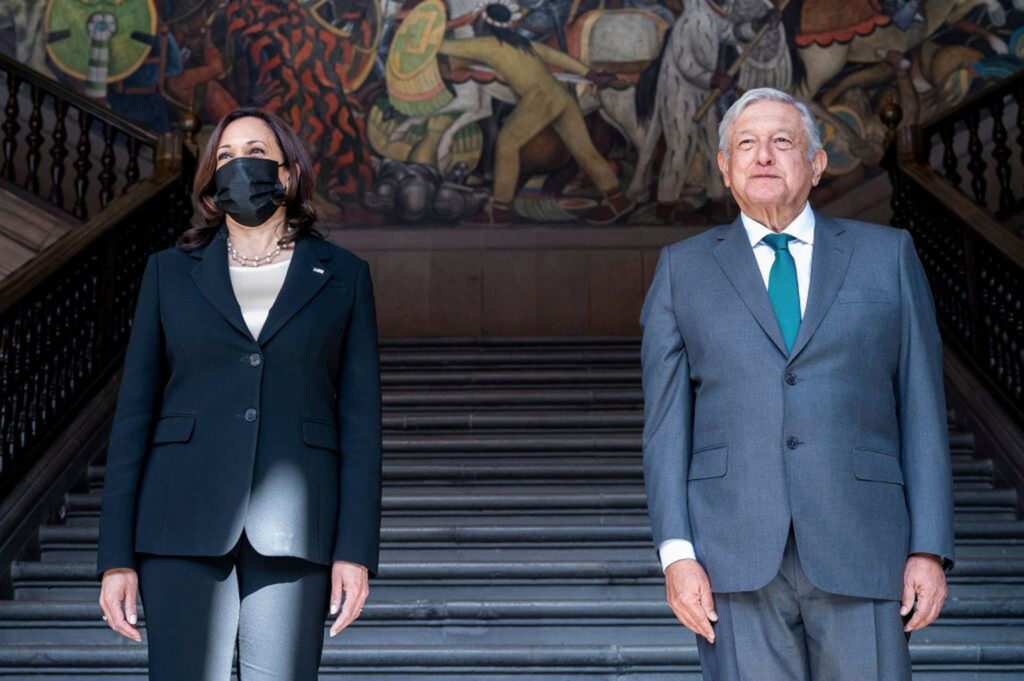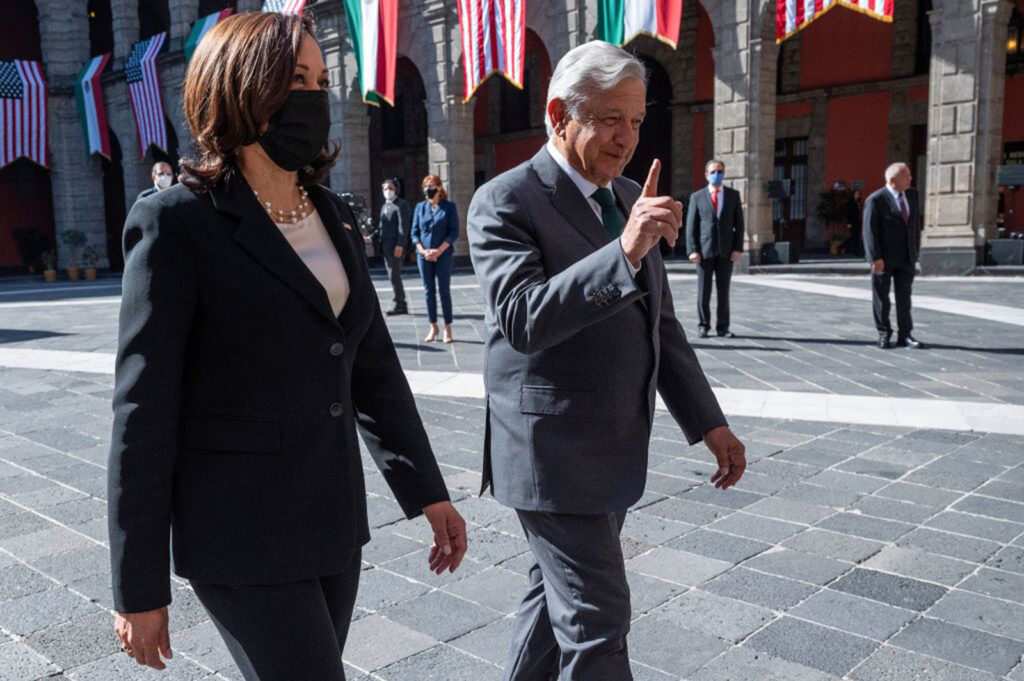Vice President Kamala Harris met with Mexican President Andrés Manuel López Obrador in his capital on Tuesday, declaring a “new era” in their nations’ relations.
She is capping off a two-day trip to Latin America, her first official journey out of the country and one aimed at curbing the influx of Central American migrants through Mexico to the U.S. border. Harris arrived after spending Monday in Guatemala City, where she met with that nation’s president, community activists and entrepreneurs.
“I strongly believe that we are embarking on a new era,” Harris said as she sat across from the Mexican president at a long polished-wood table in a salon of the National Palace. She noted the “interconnection and interdependence” of the two nations.

López Obrador welcomed the “very important meeting,” remarking on the 2,000-mile border that Mexico shares with the United States. He was the only member of the two countries’ diplomatic delegations who did not wear a mask to protect against the coronavirus.
Though Harris’ primary focus is immigration, the meeting is also important in more broadly defining a pivotal diplomatic relationship for the Biden administration with Mexico, America’s southern neighbor, close ally and No. 1 trading partner.
“We have a partnership, a long-standing partnership,” Harris told reporters late Monday as she left Guatemala City for Mexico City. “That is the basis of this conversation.”
She said Monday she would also discuss “Mexico’s role as it relates to this region” in reducing migration from Guatemala, Honduras and El Salvador.

Before their one-on-one session Tuesday, López Obrador welcomed Harris in a brief ceremony on the central patio of the National Palace. “Mucho gusto,” she responded in Spanish. “It’s very good to see you.”
They were greeted by salutes from uniformed military personnel and looked on as American and Mexican representatives signed an agreement to broaden U.S.-Mexico cooperation on sending development money to the three Central American countries that are the source of most northbound migrants fleeing poverty and violence — Guatemala, El Salvador and Honduras. The text of the agreement has not been released, so it is unclear how broad or meaningful it is.
As López Obrador showed Harris the spectacular mural by Diego Rivera that overlooks the courtyard and depicts centuries of Mexican history, he responded to a question shouted by a reporter asking whether he would increase security at Mexico’s border with the United States.
“We are very pleased to have her here and we will touch on that subject but always addressing the fundamental root causes,” he said.
Ricardo Zúñiga, the administration’s special envoy to the three Central American countries known as the Northern Triangle, said Mexico, like the United States, had an interest in deterring migration from them. “We are both destination countries” for migration from the Northern Triangle, he told reporters aboard Air Force Two on Monday night.
In addition to meeting with López Obrador, Harris will speak with female entrepreneurs and hold a separate meeting with labor leaders. She is leading the Biden administration’s efforts to expand organized labor in the United States, and administration officials see López Obrador, who has also championed labor rights, as a kindred spirit. Yet some U.S. unions complain that Mexico is not living up to its promises in trade deals to support labor rights.
Administration officials had not expected the meeting with López Obrador to be necessarily easy or predictable. In national elections Sunday, he appeared to be losing sway in the legislative branch, where many of his allies were defeated. The final results are not yet clear.
His reaction to the elections “really doesn’t impact our plans,” Zúñiga said, insisting the two nations’ relationship does not depend on who is in power.
López Obrador has at times taken shots at the United States to win favor with his domestic audience. Just before a virtual meeting with Harris in May, he sharply criticized American aid to an anti-corruption group, even as Harris was emphasizing the need to root out corruption in Latin America to stem migration north.
López Obrador has attacked other independent watchdogs and reporters, posing a challenge to the Biden administration given its stated goal of promoting democratic institutions around the world. Yet the leftist has maintained favor with the United States, including during the Trump administration, helping with border enforcement. Consequently, the administration is treading lightly with López Obrador, and Harris was not expected to be critical.
The topic of immigration, as well as Harris’ presence in Mexico, has complicated the vice president’s efforts to distance herself from the administration’s struggle to control the border — a potential political liability — and instead to focus on diplomacy within the region. Republicans have harshly criticized her for failing to visit the border.
But her discussions about border security, together with her declaration in Guatemala on Monday that people who crossed the U.S. border illegally would be turned back, underscore how the issues are intertwined. Back in the United States, Harris was criticized by some on her party’s left for the warning to migrants, “Do not come.”
“The U.S. spent decades contributing to regime change and destabilization in Latin America,” Rep. Alexandria Ocasio-Cortez, D-N.Y., wrote on Twitter. “We can’t help set someone’s house on fire and then blame them for fleeing.”
The Interfaith Migration Coalition, a group of U.S.-based religious leaders, admonished Harris that seeking asylum was not illegal. The Catholic Church in Mexico urged “true reciprocal collaboration” between the two governments to address migration.
Asked why she was not visiting the border, Harris said in Guatemala that she came to speak with “the leader of this nation around what we can do in a way that is significant, is tangible and has real results.” She added, “And I will continue to be focused on that kind of work as opposed to grand gestures.”
Later, in an interview by NBC News, she bristled when broadcaster Lester Holt pressed her again about a border visit. “And I haven’t been to Europe,” Harris responded. “I don’t understand the point that you’re making. I’m not discounting the importance of the border.”
___
© 2021 Los Angeles Times Distributed by Tribune Content Agency, LLC



